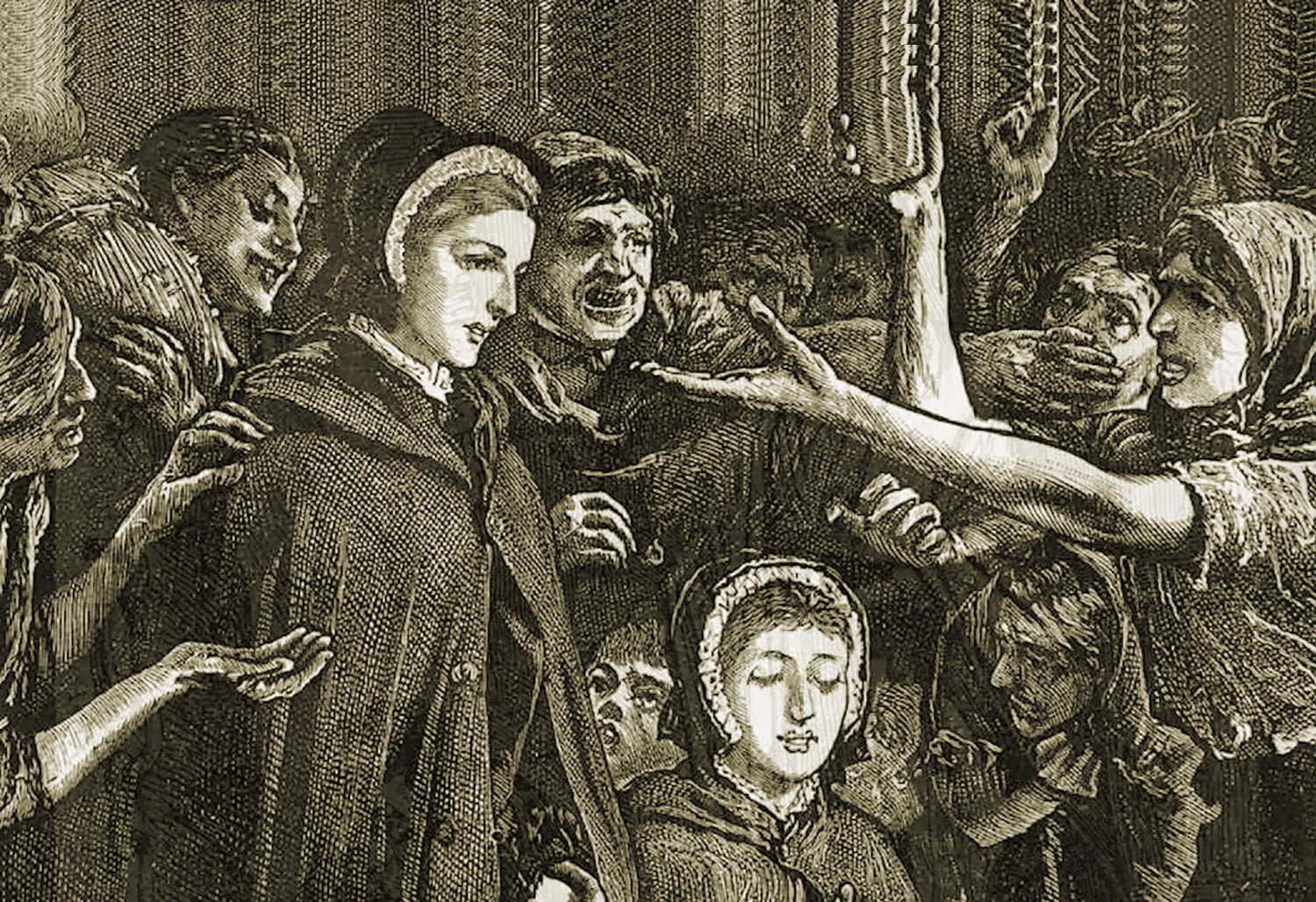Elizabeth Fry was a Quaker minister whose tireless efforts to reform the conditions of female prisoners in London influenced prison reform across the world and caused her to become one of the most prominent women in England.
The Prisoner’s Friend
“It is an honor to appear on the side of the afflicted.”
– Elizabeth Fry, upon becoming the first woman to testify before Parliament.
Elizabeth “Betsy” Fry (1780 – 1845) was the leading figure in efforts to reform Britain’s prisons during the Victorian Era. Born to a middle-class Quaker family, she was greatly influenced by the preaching of William Avery, an American Quaker who taught that even the worst of sinners could be changed through the power of the Gospel. She never forgot hearing him say: “No lives are so unlovely, none so unworthy or so lost, that they are beyond the reach of God’s transforming light. And you can bring them to that same saving light.”
MINISTRY AT NEWGATE PRISON
When Fry first visited London’s infamous Newgate Prison in 1813, she found the scene to be reminiscent of a den of wild beasts. The female prisoners—many of whom had engaged in theft and prostitution—were dirty and poorly dressed; they used foul language and fought amongst themselves, and some were inebriated. At night, the women’s prison turned into a brothel for male prisoners and guards. In a biography of Fry entitled Betsy, author Jean Hatton states that Fry looked into the two wards where 300 women and their children were crammed and saw “a seething mass of creatures, half spirit, half human, phantoms with substance, with contorted faces and twisted hearts. Unpredictable and malevolent, they meant everyone harm. Sick women lay on a bare stone floor, frozen in the bitter winter weather, on scanty straw rank with urine.” There was “the smell of unwashed bodies, urine and excrement, alcohol and rancid food, sweat, blood and vomit… while the noise, of hundreds of voices screaming, bellowing, wailing and sobbing, clamoured in the air and beat frantically upon the ears. Betsy saw to her horror that lice crawled in the eyebrows and hair of the stinking women that pressed against her. In the women’s eyes as she returned their gaze… she saw a terrible and Godless hopelessness.”
Looking at the children sharing this squalor with their mothers, Fry asked: “Isn’t there something we can do for these innocent little children?” As the prisoners gathered around her, she began to tell them about the love of Jesus. “‘Jesus,’ she told them, ‘came especially to save sinners like us.’ A young woman looked up at her and asked, ‘Who is he, Madam?’”
Determined to remedy these frightful prison conditions, Betsy organized a society of Christian women to bring fresh food and clothing to the inmates and their children; she also hatched a plan to start a school within the prison to teach the Bible to the children and train the women for useful employment. When she approached the prison’s administrators, they told her that such efforts would be fruitless. The women, she was told, were hopeless degenerates; they would have no interest in such things. Hearing this, Fry asked to be let back into the prison again. She then returned to announce that the women had agreed to set aside a space to become their classroom and had chosen Mary Connor, one of their more educated fellow inmates, to be their teacher. Reluctantly, and with great skepticism, the prison officials agreed to let Betsy try her experiment.
“The next day,” Hatton writes, “Betsy returned to the prison, and after installing Mary Connor formally as teacher she founded the first school in British Prison history.”
REMARKABLE FIRST RESULTS
Despite being told by many people—including several notable Christian leaders—that the Newgate prisoners were unteachable, Betsy forged ahead. On day one, she began teaching 30 of the women’s children. These numbers quickly grew, and eventually the women themselves asked to be taught how to read and sew. Betsy agreed. Right away, 70 women signed up to join the school. Fry allowed the women to work together in establishing a set of rules and a daily schedule for bathing, cleaning their living areas, prayer and Bible study, and reading classes. The women also engaged in needlework and sewing projects so that their handiwork could be sold outside the prison to raise money.
The fruit of Fry’s labors at Newgate Prison is a great testimony to the power of the Gospel, the Bible, and the love of Jesus Christ in transforming human lives. Hatton reports: “Barely two weeks after Betsy’s workshop began, the Reverend C. B. Taylor recorded his impressions of the women’s wards once known as ‘Hell above ground.’ He found the transformation hardly believable. Rather [than] the clamor and wild women he remembered from previous visits, he was met by a newly appointed yards-woman, who, after bobbing him a curtsey, led him through a well-swept quiet yard to a long chamber. There a woman in Quaker dress sat reading to a group of 16 other women who were all busily sewing. Each one wore a clean blue apron and bib… The room was clean and smelled freshly of whitewash… ‘Instead of a scowl or ill-suppressed laugh, [he said] their countenances wore an air of self-respect and gravity, a sort of consciousness of their improved character, and the altered position in which they were placed.’ ‘Already, from being like wild beasts, they appear harmless and kind,’ Betsy said of her convicts. ‘I am ready to say, in the fullness of my heart, it is the [Lord’s] doing, and marvelous in our eyes.’”
INSPIRING MUCH-NEEDED REFORMS
Imprisoned women were treated poorly in Betsy’s day. Society was more interested in punishing and executing criminals than in rehabilitating them. In the early 1800’s, 160 different offenses warranted the death penalty by hanging; these offenses included pickpocketing and stealing small amounts of money. Within the prisons, gloom, disease, drunkenness, unsanitary conditions and sexual exploitation ran rampant.
Having become a leading spokesperson for prison reform, Elizabeth Fry became the first woman ever to testify before a Parliamentary Committee. She lobbied for many needed reforms, such as the elimination of the death penalty for minor offenses, the separation of male and female prisoners, the provision of better treatment for mentally ill prisoners, the separation of young offenders from hardened criminals, the introduction of religious instruction in prisons, and the provision of education and employment opportunities for inmates. William Wilberforce—who fought so valiantly to eliminate the slave British trade—joined Betsy’s crusade, as did other Christian legislators. Even the Queen of England arranged to speak with Betsy and offered her support.
Thereafter, Elizabeth traveled to Scotland and Ireland to visit prisons and issue reports on prison conditions. She had attained such a remarkable stature in society that sheriffs would allow her to tour their jails and prisons, and would take seriously her suggestions about potential reforms. Fry engaged in similar activities with regard to workhouses for the poor, asylums for the mentally ill, and inhumane prison ships used to transport female criminals to Australia.
Everywhere she went, Fry was met with large crowds and was treated almost like royalty. It was once said that aside from the Royal Family, Elizabeth Fry was the most noted and honored woman in England in her generation. By working hand-in-hand with members of Parliament, she made it possible for many important laws to be passed and pioneered the idea of rehabilitation within the prison population. Elizabeth Fry greatly improved the living conditions of thousands of people in various institutions and inspired an entire generation of Christian women to work toward a better and more just society.


